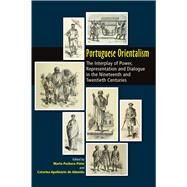Portuguese Orientalism The Interplay of Power, Representation and Dialogue in the Nineteenth and Twentieth Centuries
, by Pacheco Pinto, Marta; de Almeida, Catarina Apolinario- ISBN: 9781789760545 | 1789760542
- Cover: Hardcover
- Copyright: 11/24/2020
Research on Portuguese orientalism has been mostly centred on the sixteenth and seventeenth centuries and has focused on missionary work and Catholic orientalism. In contrast, reflection on the nineteenth and twentieth centuries is scarce and has relied on individual case studies, notwithstanding the TECOP (Texts and Contexts of Portuguese Orientalism: The International Congresses of Orientalists, 1873-1973) research project. This edited collection is the result of an international forum (www.tecop.letras.ulisboa.pt) hosted by the Centre for Comparative Studies, the University of Lisbon. The editorial aim is to counter the scant attention paid to Portuguese orientalist scholarship, which has been peripheralized within the comparative history of western imperialisms at large and within national orientalisms in particular. Incorporating Portugal into a broader European colonial discourse about the East and discussing the responses to Portuguese colonial legacies gives visibility to the agency of the multiple actors and networks implicated in the Portuguese modern connection to the East. Essays cover former Portuguese India (Goa), Macau, Timor and Japan, as well as East Africa, Egypt, and even Angola as an expansive site of the Portuguese orientalist rhetoric. The chapters by necessity revisit Edward Said’s Orientalism (1978), making use of its analytical framework. They foster an understanding of Portuguese orientalism as an epistemological system supported by an elite—either intellectual, scientific, or literary—that assumed different material manifestations in the shape of colonial policies, scientific expeditions, exhibitions, press and literary publications, radio broadcasts, and the institutionalization itself of orientalist knowledge. This is the first collection in the English language overtly expressing an intention to examine this epistemological contribution.






